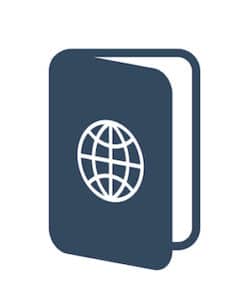2020-2021 Immigration in a COVID-19 World
A year ago, very few people would have predicted that we would live through a pandemic in our lifetime. Until mid-March 2020, very few people used (or even thought) about the word pandemic, except when fueled by the occasional horror movie.
But here we are, January 2021, forming new habits as necessary – taking Zoom calls in our pajamas (well, maybe just the bottoms), opting for contact-free food delivery, and – if we’re contemplating moving across borders – regularly checking the news for updates on new changes to immigration policies.
On the bright side, it’s a great time to get a puppy – unfortunately, this is because travel seems to be a thing of the past. With restrictions set by most countries, hopping across borders is getting harder for both travel and immigration purposes. By April 2020, 90% of the world’s population (that’s 7.1 billion people) lived in countries with restrictions on people arriving from other countries. This included tourists, students, people traveling for business purposes, and new immigrants.
While the exact period seems to be changing constantly, most countries also have a self-quarantine period of 14 days in effect. A lot of these restrictions are still in place as we slide into 2021, with phrases like ‘border closures’ and ‘travel ban’ becoming commonplace. Employers have had to make changes to remain compliant with evolving regulations, so here we’ll take a look at some of these changes that could affect your organization.
United States
According to the National Immigration Forum, Trump’s administration has issued over 48 policy changes impacting nearly every facet of the immigration system since the start of the pandemic.The H-1B visa system, which allows American employers to temporarily employ foreign workers in specialty occupations, has been under constant modification.
As of January 8, 2021, the US announced that it is changing the selection process for the H-1B visa, prioritizing salary and skills over the current lottery system. Visa issuance declined in 2020, and there has been a significant backlog in permanent residence applications.
United Kingdom
One word: Brexit. The UK leaving the EU influenced immigration policies greatly, to say the least. According to a policy statement issued in February 2020, a new points-based system begins in January 2021. It’s supposed to enable the UK to take control of its borders, reduce overall migration, and give priority to those with the highest skills.
There will be no general low-skilled or temporary work route – the policy stresses moving away from relying on “cheap labour” from Europe.

Europe
Minimum salary wages rose in Europe in 2020. To address labor shortages and increased demand for skilled workers, Switzerland announced that it has set work-permit quotas for 2021 that aim to encourage foreign workers to enter the country.
The pandemic made it harder on asylum-seekers and immigrants to enter Europe, as The New Humanitarian pointed out:
The coronavirus pandemic led to a 30 percent drop in the number of people applying for asylum in the EU in the first nine months of last year due to constraints on international travel and hardline policies enacted at the EU’s external borders that made it more difficult for people seeking protection to reach the 27 member bloc.
Asia Pacific
Several countries throughout APAC strengthened their policies on immigration. For instance, new immigration and work visa requirements by the Singaporean government shift their focus to quality in their foreign talent policies – especially in the technology sector. They also imposed harsher penalties on employers who were found guilty of discrimination.
China has seen increasing levels of xenophobia toward foreign migrants, some of it related to the pandemic. Still, many there are welcoming of foreign workers, particularly those with higher levels of education who can contribute to the burgeoning economy.
[bctt tweet=”It’s a great time to get a puppy – unfortunately, this is because travel seems to be a thing of the past.” via=”no”]



